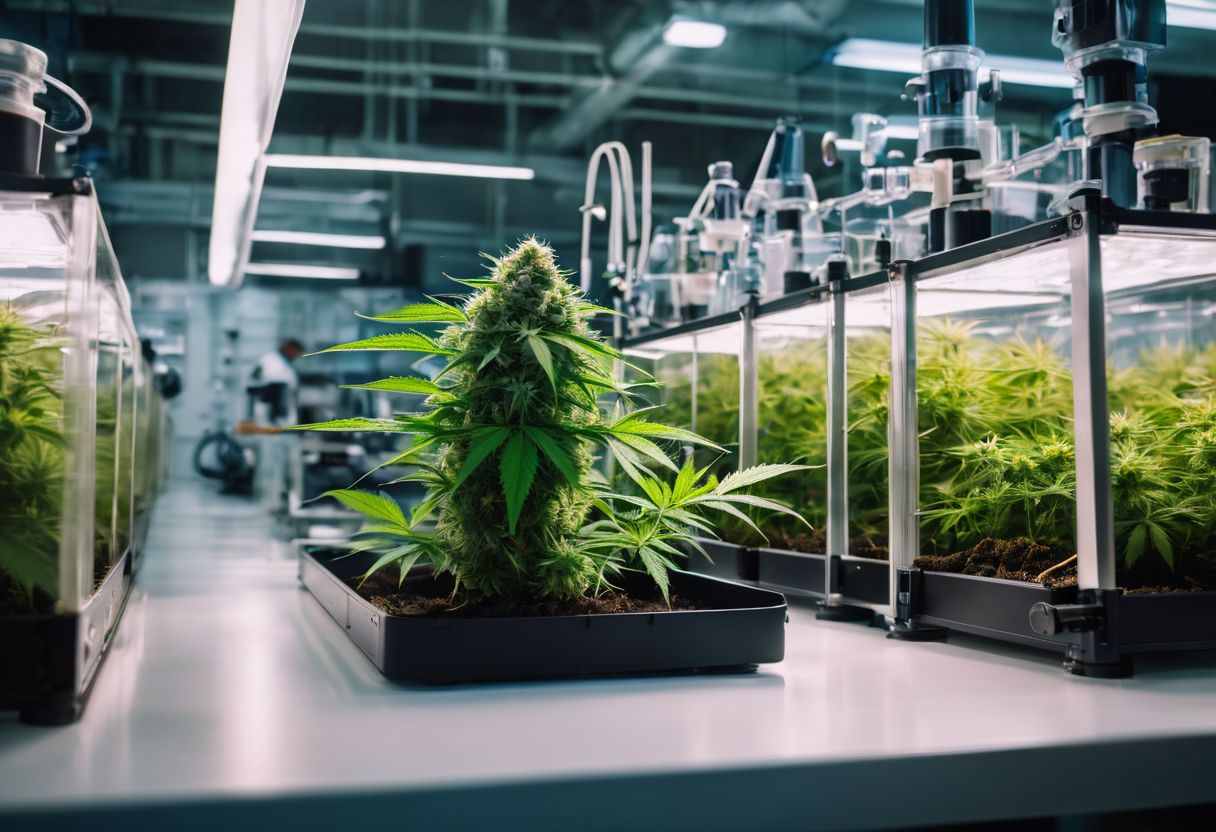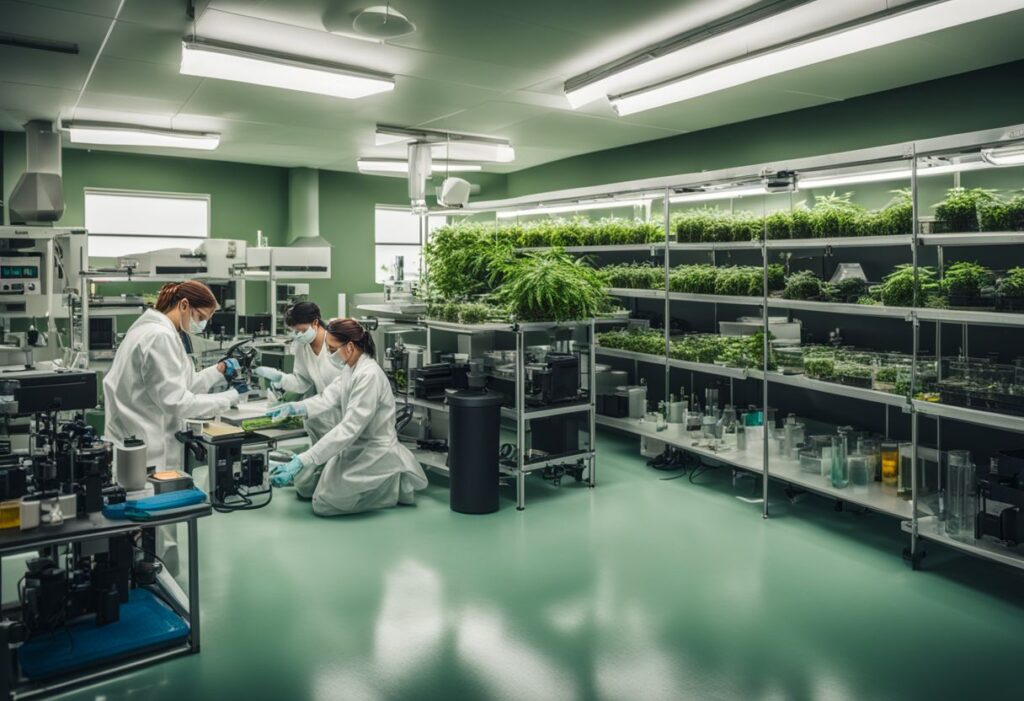Clients are able to receive a free 30-minute consultation with a company representative to get a better understanding of what they need.
Let Us Do the hard work for you

In the landscape of cannabis innovation, obtaining a research license in Canada stands as a pivotal step for pioneers aiming to unlock the plant’s full potential. Underpinned by rigorous regulatory frameworks, this process ensures that studies on tetrahydrocannabinol (THC), cannabidiol (CBD), and other phytocannabinoids meet the nation’s high standards for ethics and public safety.
With extensive experience navigating these protocols, we deliver insights grounded in industry best practices and regulatory compliance.
The journey towards acquiring a cannabis research license is intricate, but armed with expert guidance, it becomes an attainable milestone. One crucial fact to note is that all prospective researchers must wade through Health Canada‘s stringent application procedure—a task demanding precision and acute attention to detail.
Read on to discover how this guide can illuminate your path every step of the way; let’s explore together what awaits beyond the initial paperwork.
Let’s dive in.

Delving into the world of cannabis research in Canada necessitates a clear grasp of the distinct licence types available, each tailored to specific facets of scientific inquiry and product development within this burgeoning field.
A comprehensive knowledge of these classifications is crucial for aligning your research objectives with the appropriate legal permissions before embarking on your investigative journey.
A Cannabis Institutional License is for places like universities and public research institutions in Canada. They need this type of license to study cannabis legally. With it, scientists can possess, produce, transport, and even sell cannabis plants and seeds as part of their work.
Their studies might look at THC, CBD or other parts of the plant.
Getting this license means following rules from the Cannabis Act and Regulations. These make sure everything is safe and legal. For example, keeping good records is a must so that researchers can show what they’ve done with the cannabis.
The law also says how to keep people safe around the stored cannabis.
Researchers use this license to find out new things about cannabis. This could be making new products or learning how different types grow best. Some might focus on medical uses in clinical trials or check if new kinds are strong enough for patents through Canadian Intellectual Property Office registrations.
Others may explore how to change industrial hemp into useful items without breaking laws.
The Cannabis Research Permit Program in Canada is important for those looking to study cannabis. With this permit, you can possess, produce and transport cannabis for research reasons.
It allows experts to explore how cannabis works and find new uses for it.
Getting this permit means filling out the right forms and proving you can safely handle the plant. You must show that your work space meets all safety rules too. This makes sure everything is done well and by the book.
Once you have a permit, keeping detailed records is key. You will need to track how much cannabis you use and where it goes. This helps follow all the strict rules about working with cannabis in Canada.
Now let’s look at what comes next: “The Application Process for a Cannabis Research License”.
Scientists study how cannabis affects people when they are not using it for treatment. They may watch how someone acts in a driving test after they have used cannabis. This work helps everyone learn more about the plant and what happens when it is used.
It makes sure we know how to keep people safe and teaches them important things about cannabis.
Canada has rules for this kind of research under the Cannabis Act. The studies have to follow these laws, so we can trust the results that come out of them. This way, companies can make new kinds of cannabis products that are good quality and safe for everyone.
To get a cannabis research licence in Canada, you’ll need to fill out the right forms and give certain documents. This ensures that your study follows all rules for cannabis research.
Getting a cannabis research license means you must follow strict rules. Health Canada checks that your study is safe and follows all the laws. Your research with cannabis drugs, cultivation, or product development needs to stick to these rules at all times.
Researchers must keep detailed records of their work. This includes how much cannabis they have and what they do with it. Inspectors might visit to make sure everything is correct.
They look at things like storage, safety, and if you’re doing what you said in your application. If you break the rules, there could be big problems for your project.
It’s important to report any changes in your study quickly. Say if new people join your team or if you change something in your plan. Staying honest and open with Health Canada helps keep everything running smoothly
To carry out research with cannabis, it’s important to have the right skills and stuff. Canada has rules for studying both growing and making things from cannabis. You might need training on how to handle the plant safely or how to follow the law.
You will also need tools and a good place to do your work.
Learning about these rules helps you know what paperwork you’ll need for your study. For example, if you want to test new ways of eating cannabis, like in food, there are special papers that explain what’s okay to do.
Getting money can help too. Sometimes people get grants or other help so they can pay for their studies without worry. This means they can focus more on their work with plants or make new things from them.
You must show that you know enough about working with cannabis before getting a license. Training programs often teach this well.
Getting a cannabis research license in Canada needs careful preparation. Follow these tips to help your application succeed.
You’ve learned lots about getting a cannabis research license in Canada. We saw how different types show what you can do with your studies. Our steps make the process feel simple and smart to follow.
Remember, doing this work helps us all learn more about cannabis safely. If you want to dive deeper, look for extra guides and official advice online!

MFLRC is a one-stop shop for all of your Licensing, quality assurance and compliance needs. Our team has years of experience in the cannabis industry and are experts in all facets. We offer a variety of services that will save you time and money. Let us take the burden off your shoulders so you can focus on what’s important – growing your business.
Contact us Now!
Mussarat Fatima, President, and owner of MF Cannabis License and Regulatory Consultants has more than twenty years of experience in Quality Assurance, Quality Control, and Regulatory Affairs within the pharmaceutical, Food and Cannabis industries. She has a Master’s Degree in Food Sciences and Biochemistry; in addition to this, she also has a diploma in pharmaceutical Quality Assurance, Regulatory Affairs, and Quality Control. Also, she has completed several certifications specifically in Cannabis Quality Assurance, Regulatory Affairs, and Facility management from recognized institutes in Canada.

Written By: Mussarat Fatima
President at MF License & Regulatory Consultants
Website: https://mflrc.com/
Contact: info@mflrc.com